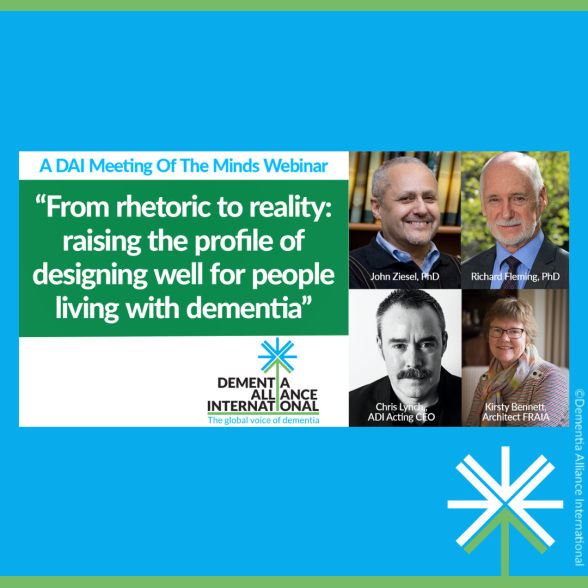In a world that is constantly evolving, our approach to design and architecture must evolve as well. In 2021, a significant step was taken toward promoting inclusivity in design through a thought-provoking webinar hosted by the Dementia Alliance International.
Featuring esteemed presenters Professor Richard Fleming, Kirsty Bennett, Dr. John Zeisel, and Chris Lynch, this webinar addressed the vital topic of designing spaces for individuals living with dementia. The discussion begins by introducing the benefits of designing well for people living with dementia. These include reducing confusion, anxiety and depression while increasing opportunities for autonomy, enjoyment and the maintenance of abilities.
The full webinar titled, ‘Designing well for people with dementia’, is below. Otherwise it can also be viewed here.
Unveiling the Principles of Dementia-Friendly Design
At the heart of this webinar was a deep dive into the fundamental principles that underpin effective design for people with dementia. Over the past thirty years, insights gleaned from research and experience have shaped these principles, making them a cornerstone of creating spaces that cater to unique needs. The principles are not only rooted in enhancing the lives of individuals with dementia but have a broader impact on society by creating environments that are beneficial for everyone.
1. Unobtrusively Reduce Risks
The first principle emphasizes safety, security, and ease of movement. It involves identifying and addressing potential risks while optimizing the use of the individual's abilities. Removing barriers such as uneven surfaces contributes to a more navigable environment.
2. Provide a Human Scale
This principle takes into account the size of the space, both in terms of the overall building and its individual components. It aims to create spaces that feel comfortable and relatable, promoting a sense of connection to the environment.
3. Allow People to See and Be Seen
Visual access is a key component of reducing confusion and promoting autonomy. Designing spaces that allow individuals to understand their location, direction, and points of interest helps in reducing disorientation.
4. Reduce Unhelpful Stimulation
Minimizing exposure to overwhelming stimuli is crucial, as people with dementia may struggle to filter out excessive sensory input. This principle advocates for a balanced approach, focusing on providing helpful stimuli while minimizing the unhelpful.
5. Support Movement and Engagement
Creating well-defined routes both internally and externally, devoid of obstacles, encourages movement and engagement. This principle fosters an environment that invites interaction and exploration.
6. Create a Familiar Space
Familiarity breeds comfort. This principle emphasizes the importance of selecting furniture, colors, and fittings that individuals are familiar with, thereby enhancing their sense of belonging.
7. Provide Opportunities for Solitude and Socialization
Choice is empowering. Designing spaces that offer the option of solitude or social interaction respects individual preferences. A variety of spaces, both indoors and outdoors, enable individuals to make choices that suit their mood and needs.
8. Provide Links to the Community
This principle highlights the significance of maintaining a person's identity and fostering interaction with the broader community. It underscores the valuable contributions that individuals with dementia can make to society.
9. Respond to a vision for way of life
A sense of purpose is important, not just to people with dementia but to everyone. It is especially important, however, to have this reflected in environments of people living with dementia. This minimizes barriers to, and reinforces our chosen way of life.
Convention on the Rights of Persons with Disabilities: Shaping Policy and Practice
A significant turning point in the discussion was the exploration of the Convention on the Rights of Persons with Disabilities. This international framework recognizes dementia as a cause of disability, paving the way to advocate for the incorporation of dementia-friendly design principles into building codes and regulations. By aligning dementia-related rights with those of individuals with physical disabilities, this convention lays the groundwork for a more inclusive and equitable future.
The Road Ahead
The webinar spurred important conversations, laying the foundation for a movement toward more dementia-friendly design. From a better understanding of the principles to the exploration of legal frameworks, this event was the catalyst for our DAI Environmental Design Special interest Group (DAI ED-SiG). As we reflect on the insights shared in this webinar, we are reminded of the transformative power of design in shaping a world that respects and includes everyone, regardless of their cognitive abilities.
If you are interested in DAI ED-SiG, you can find more info here.
To access the webinar, click here.
Since you’re here…
We’re asking you to support our members, by donating to or partnering with our organization. With more than 55.2 million people living with dementia, our work has never been more important. Donating or partnering with us will make a difference to the lives of people with dementia: https://www.dementiaallianceinternati...
Membership of, and services provided by Dementia Alliance International is FREE, and open to anyone with a diagnosis of any type of dementia. Join DAI here: /get-support/become-a-member
Read our newsletters or regular blogs, by subscribing here: /blog
About DAI: Dementia Alliance International (DAI) is a non-profit group of people with dementia from around the world seeking to represent, support, and educate others living with the disease that it is possible to live more positively than advised with dementia. It is an organization that promotes a unified voice of strength, advocacy and support in the fight for individual autonomy, improved quality of life, and for the human and legal rights of all with dementia and their families.
